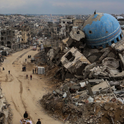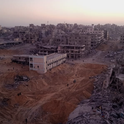A prominent British Jewish journalist was explaining the dilemma that Israel faced over the rising death toll in Gaza. “At the heart of this,” he said, “from a humanitarian point of view, it’s disastrous.” But he added that we had to consider what the US did when attacked on 9/11: it invaded Iraq, with 200,000 [his figures] killed in three years. And the British in the Second World War? “They firebombed Dresden, burning alive 25,000 civilians.”
You could see the point he was trying to make (on the latest episode of the Media Confidential podcast). Israel had been murderously attacked and was not going to take any lectures from the citizens of countries which, in a comparable situation, had famously—or infamously—retaliated with brutal force.
The counterargument, with the wisdom that hindsight comfortably brings, is that Iraq and Dresden are surely compelling arguments for not bombing even larger areas of Gaza into dust over the coming days and weeks.
Few people now defend the unleashing of so much pain and chaos on Iraq—and the wider region—in the wake of 9/11.
The unease over Dresden began within weeks of the devastation of the city, with Churchill himself carefully distancing himself from responsibility. Numerous military histories and moral tracts have since expressed revulsion at the area bombing of German towns and cities in 1945, bringing death to countless innocent people on a scale the world had rarely, if ever, seen before.
The horror of Dresden happened just eight years after Picasso had painted Guernica, commissioned in horrified response to the 1937 bombing of the ancient Basque town by fascists, killing at least 1,600 civilians, mainly women and children. It was the start of a novel and systematic form of warfare on these innocent groups, with Liverpool, London and Dresden among the next grim milestones.
The best friend is a candid friend. Which is why those who wish Israel well have something like a duty to challenge some of the rhetoric and decisions made in what we might consider understandable blind rage. And they should be free to do so without kneejerk accusations of taking sides.
I thought back to an article the New York Times columnist Thomas Friedman wrote barely a week ago, titled “Israel is about to make a terrible mistake”. I have been reading Friedman, probably the most influential foreign affairs correspondent in the world, for many years and had never read such alarm in his tone.
“The hour is late,” he wrote. “I have never written a column this urgent before because I have never been more worried about how this situation could spin out of control in ways that could damage Israel irreparably, damage US interests irreparably, damage Palestinians irreparably, threaten Jews everywhere and destabilise the whole world.”
So that’s the geopolitical reason for friends of Israel—appalled as they are by the hideous and unforgivable events of 7th October—to urge restraint over Gaza.
But I suspect most ordinary people don’t think in geopolitical terms. They may well have a more basic human reaction to the horror of what is unfolding in the crowded patch of land, barely the size of the Isle of Wight, where 2.5m people, half of them under 18, are sheltering from thousands of bombs and lacking the basics of water, food, fuel, and medicines.
The modern polarisation of political debate assumes that you have to sign up to one camp or the other. But I suspect most people feeling horror-struck by what they’re currently seeing in Gaza were equally disgusted by the atrocities committed by Hamas on 7th October.
It’s not either/or. As perhaps Keir Starmer is belatedly realising.
Ten days after the Hamas attacks the Telegraph—normally, even now, a sober broadsheet—cleared most of its front page to warn its readers, in tabloid typesetting, of a photograph of a dead Israeli baby on page three. “This image,” it proclaimed, “may be worth a million words.”
It was, indeed, a heartbreaking picture. But five seconds spent on social media the same day would readily produce other images, equally hard to forget. I saw one of a blackened body of a small child, burned beyond recognition and with missing limbs, being stretchered into a hospital in Gaza. Was this also worth a million words?
So I suspect most people currently carry a few simultaneous thoughts in their head. They are disgusted by Hamas and abhor its sadistic and hate-filled attacks on 7th October. They stand with Israel and acknowledge the country’s right to defend itself. They want Hamas crushed.
At the same time, they are revolted by the slaughter of civilians in Gaza and the denial of the most basic humanitarian aid. They don’t know how you eliminate Hamas without killing thousands of innocent Palestinians—the death toll is already a reported 6,000 and counting at the time of writing. They want the bombing to stop, and the hostages released. And they probably don’t trust Bibi Netanyahu to be in charge of Israel at this moment in its history.
They want to be free to say all these things. And they do not want to be pigeon-holed as anti-this or pro-that for holding all, or any, of the above reactions.
I spent one day in Gaza, maybe 20 years ago. Even then I found it a place of great foreboding and suffering. My fixer and translator for the day was a young woman called Ghada Ageel, and I was much struck by her calm and grace in the face of the nearby explosions that were commonplace even then.
Ghada is now a visiting professor in Alberta, Canada: she was one of the lucky ones who escaped Gaza. This week Ghada learned that numerous members of her husband’s family had been killed in Khan Younis, Gaza, in an Israeli attack. Further strikes also flattened a block of flats in South Gaza—the supposedly safer zone—where Ghada’s family had a home. She, too, is blinded by rage and grief at the moment.
I don’t have the wisdom to know how to de-escalate such a terrible moment. I’m grateful for leaders who don’t feel the need to take sides.
And I know no picture of a dead baby is worth a million words.













